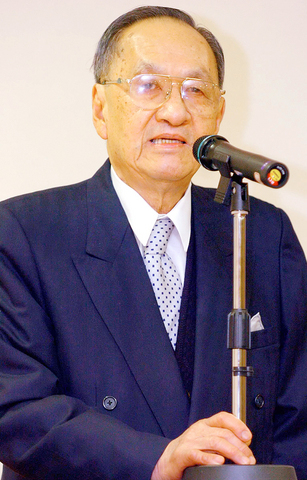At the heart of the controversy over President Chen Shui-bian's (陳水扁) proposal to scrap the National Unification Council and unification guidelines are the pledges made by Chen in his first inaugural address. Many feel that in making the pledges, Chen created more problems for himself than he resolved.
Vice President Annette Lu (
She also claimed that the precondition did not exist when the pledges were made.

PHOTO: CHANG CHIA-MING, TAIPEI TIMES
Chen promised that as long as Beijing had no intention of using military force against Taiwan, he would not declare independence, change the national title, enshrine the "state-to-state" model of cross-strait relations in the Constitution or hold a referendum on independence or unification.
Chen's final pledge was that abolishing the NUC and unification guidelines "would not be an issue."
Peng Ming-min (
"He has lost a lot of supporters because of that," Peng said.
Peng, however, said that he believes there are complex reasons for why Chen did so. He also believes that Chen was well aware that he would run the risk of losing support by making the pledge.
Chen was later criticized for agreeing to discuss the issue of "one China." Beijing, however, insisted on setting that as the precondition for the resumption of cross-strait talks.
As the US government has expressed the hope that Chen will reiterate the pledges, Peng said that he wonders why the US did not strongly condemn China's Anti-Secession Law, the enactment of which he sees as more serious than doing away with the unification council and guidelines.
Peng said that he cannot be certain whether Chen will reiterate the pledge, but that the US government must realize that the premise of the pledges no longer exists, as the status quo in the Taiwan Strait is dynamic, rather than static.
"US Secretary of Defense Donald Rumsfeld once said that China is the only country in the world that is not threatened by any other country," Peng said. "It makes me wonder why China keeps making double-digit increases in its military budget each year. The answer is simple and clear: they want to make themselves so strong that the US won't be able to interfere in whatever happens in the Taiwan Strait. When China is ready, the first thing they will do is change the status quo."

The Ministry of Economic Affairs has fined Taobao NT$1.2 million (US$36,912) for advertisements that exceed its approved business scope, requiring the Chinese e-commerce platform to make corrections in the first half of this year or its license may be revoked. Lawmakers have called for stricter enforcement of Chinese e-commerce platforms and measures to prevent China from laundering its goods through Taiwan in response to US President Donald Trump’s heavy tariffs on China. The Legislative Yuan’s Finance Committee met today to discuss policies to prevent China from dumping goods in Taiwan, inviting government agencies to report. Democratic Progressive Party Legislator Kuo Kuo-wen (郭國文) said

The Ministry of Economic Affairs has fined Taobao NT$1.2 million (US$36,900) for advertisements that exceeded its approved business scope and ordered the Chinese e-commerce platform to make corrections in the first half of this year or its license would be revoked. Lawmakers have called for stricter supervision of Chinese e-commerce platforms and more stringent measures to prevent China from laundering its goods through Taiwan as US President Donald Trump’s administration cracks down on origin laundering. The legislature’s Finance Committee yesterday met to discuss policies to prevent China from dumping goods in Taiwan, inviting government agencies to report on the matter. Democratic Progressive Party

Taiwan and its Pacific ally Tuvalu on Tuesday signed two accords aimed at facilitating bilateral cooperation on labor affairs, according to Taiwan’s Ministry of Foreign Affairs (MOFA). The governments inked two agreements in Taipei, witnessed by Foreign Minister Lin Chia-lung (林佳龍) and visiting Deputy Tuvaluan Prime Minister Panapasi Nelesone, MOFA said in a news release. According to MOFA, the agreements will facilitate cooperation on labor issues and allow the two sides to mutually recognize seafarers’ certificates and related training. Taiwan would also continue to collaborate with Tuvalu across various fields to promote economic prosperity as well as the well-being of their

Sung Chien-liang (宋建樑), who led efforts to recall Democratic Progressive Party (DPP) Legislator Lee Kun-cheng (李坤城), was released on bail of NT$80,000 today amid outcry over his decision to wear a Nazi armband to questioning the night before. Sung arrived at the New Taipei District Prosecutors’ Office for questioning in a recall petition forgery case last night wearing a red armband bearing a swastika, carrying a copy of Adolf Hitler’s Mein Kampf and giving a Nazi salute. Sung left the building at 1:15am without the armband and covering the book with his coat. Lee said today that this is a serious